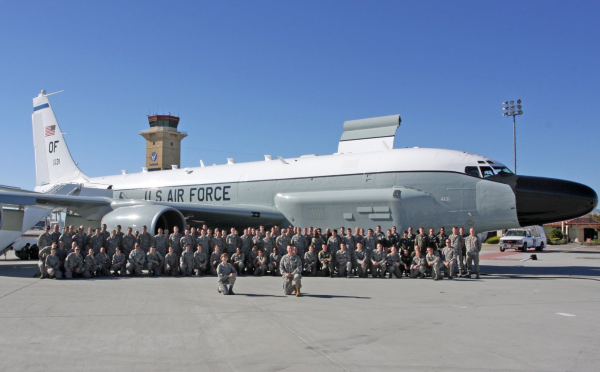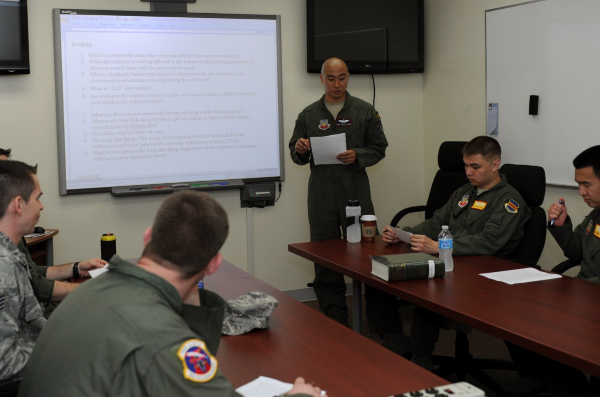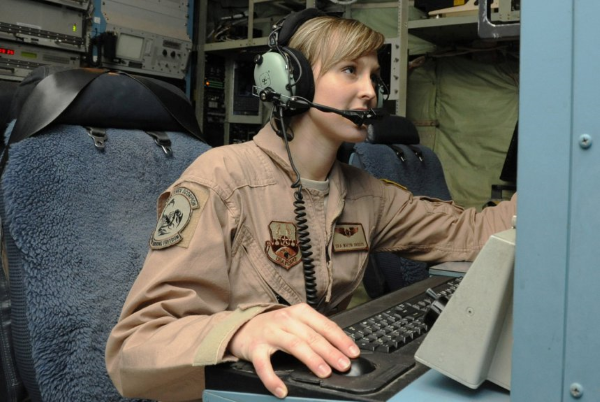An abundance of flight time and a demanding but rewarding job await those who train to become an Air Force Airborne Cryptologic Linguist.
To do this job, you will be expected to learn a foreign language fluently in less than 15 months’ time.
Here are some of the main duties that an Air Force Airborne Cryptologic Linguist will perform.
- Performs assigned aircrew duties on mission aircraft
- Processes, exploits, analyzes, and disseminates signals intelligence information
- Operates and maintains airborne signals intelligence systems and other mission-specific equipment
- Translates, evaluates, and reports on assigned communications
- Analyzes message traffic for intelligence worthiness
- Receives, transmits, and relays encoded and decoded messages
This is one of the most important Air Force intelligence-gathering jobs, and it also gives those who enter into this career field a chance to be an important part of an aircrew.
Being able to listen in on communications from hostile countries can make all the difference in any strategic scenario or tactical engagement.
Jump To A Section
Air Force Airborne Cryptologic Linguist Requirements and Qualifications
Here are the prerequisite requirements that must be fulfilled before any Air Force enlisted member can enter into this career field.
Educational Requirements
- High School Diploma
- GED
- GED with 15 college credits
ASVAB Requirements
- Minimum ASVAB Score of 72 in the General category
Additional Qualifications
- Be between the ages of 17 and 39
- Height must be between 64 inches and 77 inches — no exceptions
- Must be able to communicate clearly when speaking
- No record or history of temporomandibular joint disorder or pain
- Be able to lift 40 lbs.
- Have the ability to type at a rate of 25 words per minute or better
- Meet all other physical qualifications for aviation service
- Receive a minimum score of 110 on the Defense Language Aptitude Battery or demonstrate proficiency in a DOD-designated acquisition language with an L2/R2 rating or better on the Defense Language Proficiency Test or pass other types of Oral language Proficiency Interviews
- Successful completion of 7.5 weeks of Air Force Basic Military Training held at Joint Base Lackland in San Antonio, TX (Not required of those with prior military experience or training)
- Must take the steps necessary to maintain eligibility to deploy and mobilize worldwide on a moment’s notice.
- Completion of a current Single Scope Background Investigation (SSBI) that leads to the enlisted member being eligible for a Top Secret security clearance
Once all of these conditions have been met, an airman will then proceed to their next duty assignment to commence technical training.
Related Article – Army Cryptologic Linguist (MOS 35P): Career Details
Training and Career Path to Become an Air Force Airborne Cryptologic Linguist
If you were one that was not fond of studying in high school or college, you may want to steer clear of this Air Force career specialty.
Training to become an Air Force Airborne Cryptologic Linguist takes hard work and commitment over what most likely will be a year and a half period of time.
Here are the different training phases that must be completed before an airman can claim they are an acting Air Force Airborne Cryptologic Linguist.
Air Force Technical Training Information

Be prepared to study as much or more as any college student in any type of curriculum in America when you train to become an Air Force Airborne Cryptologic Linguist.
This Air Force specialty features one of the longest and most intellectually demanding tech schools that can be found in any branch of the military.
Depending on an airman’s assigned language, their time in tech school may last as long as 15 months.
By the end of tech school, you will be expected to be near the equivalent of a native speaker in your assigned language.
You will also do a little moving around as you are training because the technical training curriculum to become an Air Force Airborne Cryptologic Linguist is held in parts at three different locations.
They are attended in order as follows:
- Joint Base San Antonio, TX
- The Presidio of Monterey in Monterey, CA
- Goodfellow Air Force Base in San Angelo, Texas
The time spent at each training base varies with the specific language an airman is being taught.
By the halfway point of technical training school, an airman will be made aware of their next duty station.
Once an airman completes technical training for this Air Force career field, they will receive college credits toward a Community College of the Air Force degree in Intelligence Studies and Technology.
Related Article – USMC Cryptologic Linguist (MOS 2671-2676): 2020 Career Details
On-the-Job Training

Although you will be very proficient in your assigned language by the time you finish tech training, you will still need hands-on experience using the special eavesdropping equipment that will be onboard your assigned aircraft.
So, you can expect to have several more months of on-the-job training before taking your own independent listening station onboard your assigned aircraft.
This training will most likely be conducted by senior non-commissioned personnel that have several years of experience as Air Force Airborne Cryptologic Linguists.
The possibility also exists that you will be asked to cross-train on several different types of intelligence-collecting aerial platforms.
Aircrew Training
All enlisted Air Force personnel that work in aircrew positions will usually be asked to participate in one or more of the following aircrew training programs before being allowed to fly.
These courses consist of:
-
Enlisted Aircrew Undergraduate Course
This course is undertaken at Lackland AFB in San Antonio, TX, and lasts just over 2 weeks.
-
Combat Survival Training Course
This is a 19-day course held at Fairchild AFB near Spokane, Washington.
-
Water Survival-Parachuting Course
Conducted at Pensacola NAS in Pensacola, FL. The course is approximately 2 days long.
There may also be other mission or aircraft-specific aircrew training that an airman in this career field is required to attend.
Related Article – Air Force Aerospace Medical Service (4N0X1): Career Details
How Much Are Air Force Airborne Cryptologic Linguists Paid?
This is a career field that is known for starting off enlisted members at a higher rank as an incentive to enter into it.
This is especially true if a new airman signs on for a six-year commitment.
Increased starting rank may also be given based on previous language proficiency and related college coursework.
There are, also, enlistment bonuses and incentives for doing this job, depending on the USAF’s recruitment needs.
Your recruiter will have more information on the specifics of this.
Otherwise, all Air Force and other military personnel are paid according to the guidelines set down by US Government lawmaking bodies. Monthly base pay is calculated according to grade (rank) and time in service.
Given the information above, an enlisted member should start out somewhere between an Airman Basic (E-1) to Airman First Class (E-3) pay grade.
The 2023 pay scale for enlisted members with less than two years of prior military experience is currently as follows:
Airman Basic (E-1): $1,917/Month after 4 months
Airman (E-2): $2,149/Month
Airman First Class (E-3): $2,259/Month
This is what is considered base pay.
Your pay will increase with each new rank you achieve and as you accumulate years of military service.
Rank advancement in the lower enlisted tier is tied to time in grade and service. At the NCO level, it also factors in testing on career and Air Force knowledge.
Related Article – Pros And Cons Of Joining The Air Force
Miscellaneous Pay and Incentives
There are other factors that may increase the amount of an airman’s pay also.
This takes into consideration such things as an individual airman’s current duty assignment and living options.
These include such miscellaneous pay incentives as:
- Housing allowance for those authorized to live off base (BAH)
- Subsistence allowance (Food – BAS)
- Temporary duty pay
- Hazardous duty pay
- Flight pay
It’s important to also remember that any necessary health care is always 100% covered for Air Force enlisted personnel.
What’s Life Like as an Air Force Airborne Cryptologic Linguist?
If you think you will enjoy flying as part of your Air Force job, you will be in good shape with this career field.
To successfully accomplish this job, it takes many hours a week up in the air practicing or going on actual missions.
Your airborne work tasks will be demanding but very rewarding at the same time.
One thing those who become an Air Force Airborne Cryptologic Linguist can expect is to have anything but a 9-to-5 lifestyle.
It’s not a highly recommended Air Force position for those that do not like to spend time away from their family.
Even if based stateside, one can expect constant temporary duty assignments.
Not to mention, that someone in this Air Force position can be summoned to anywhere in the world at a moment’s notice if there is a need for intelligence gathering in that area of the world.
There is not a lot of time for anyone that acts as an Airborne Cryptologic Linguist in the Air Force to pursue continuing education toward a college degree either.
Here are two very informative YouTube videos that talk more about what it’s like to serve as an Air Force Airborne Cryptologic Linguist:
As with any Air Force career, there will be downtime where an airman can enjoy both leisure activities on base and in the civilian community.
On-base activities and facilities may include:
- Base-sponsored sports and recreation
- Reduced price on base shopping facilities
- Use of the gyms, sports courts, bowling, swimming, and golf facilities that exist on many large Air Force Installations
Every enlisted member in the Air Force, regardless of position, is also provided with 30 days paid leave each year in peacetime.
Related Article – 10 Benefits Of Being A Military Wife (and 5 not-so good things)
Job Reviews
Most everyone that writes reviews about this Air Force career talks about how demanding their job is or was.
The majority also find it enjoyable and rewarding.
Here is what a few ex-Air Force Airborne Cryptologic Linguists had to say on Indeed.com about their time in the Air Force:


Air Force Airborne Cryptologic Linguist Civilian Career Opportunities
One might think there is not a lot of need for ex-Air Force Airborne Cryptologic Linguists in the civilian workforce but that’s not true.
There are many government and civilian job positions that need people with special language skills to fill them.
These can be anything from liaison positions at foreign embassies to working at the United Nations.
Some of these jobs pay extremely well too.
Here are some specific companies and government entities that hire people with similar language skills to what ex-Air Force Airborne Cryptologic Linguists have learned.
- Army, Navy, Marines, Air Force, and Air Force Reserve (for training and to fill government contractor positions) – Various locations
- Defense Intelligence Agency – Washington, D.C.
- Department of Homeland Security – Washington, DC
- Department of Defense – Washington, DC
- National Security Agency – Fort Meade, MD
- Chenega Corporation – Fort Gordon, GA
- Leidos – Reston, VA
- MultiLingual Solutions, Inc. – Continental, OH
- CACI – Wright-Patterson AFB, OH
If you did your Airborne Cryptologic Linguist job well during the time you were in the Air Force, you stand a great chance of landing a well-paying civilian job as a translator or interpreter.
The majority of these jobs will start out at better than $50,000 per year
Also, do not forget that a Top-Secret security clearance is a valuable commodity that can get your foot in the door to a well-paying civilian job.
Related Article: 9 Common Private Military Contractor Jobs (and 3 uncommon ones)
References:
Official Air Force Recruiting Page
Air Force Reserve Official Page
- 5 Worst Jobs in the Air Force - June 20, 2024
- 4 Steps For Visiting An Air Force Recruiter Near You - June 19, 2024
- Air Force Safety Specialist (1S0X1) - June 19, 2024
General FAQ
What is an airborne cryptologic linguist?
USAF Cryptologic Linguists work both in the air and on the ground. Airborne linguists process and analyze intelligence signals and other messages and disseminates them to the appropriate agencies.
Do Air Force linguists get deployed?
Airborne Cryptologic Linguists are frequently deployed on an as-needed basis due to the high demand of their skills.
What language is most needed in the military?
Each branch of the U.S. military has job positions for interpreters with their own descriptions. Overall, languages in high demand currently include Arabic, Chinese, Russian, and Korean.
How long is Cryptologic Linguist tech school for the Air Force?
Training to become a USAF Airborne Cryptologic Linguist at the Defense Language Institute at Monterey, CA, is intense, with 8 to 15 months of language training depending on the complexity of the language and your ability to learn it.
How much does a cryptologic linguist make?
Like all USAF positions, an Airborne Cryptologic Linguist is paid according to rank and time in service. However, there are other allowances and incentives, including flight pay and hazardous duty pay.
Originally posted on July 23, 2019 @ 5:18 pm
Affiliate Disclosure: This post may contain affiliate links. If you click and purchase, I may receive a small commission at no extra cost to you. I only recommend products I have personally vetted. Learn more.
